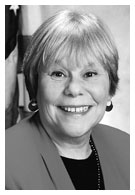|
2006 Assembly Actions
2006 Assembly Bills Aiding Micro-Businesses
A. 907 – Sponsored by Assemblyman Joseph D. Morelle.
Creates a business outreach center network assistance program and revolving fund.
A. 2850 – Sponsored by Assemblywoman Aurelia Greene.
Creates a community development financial institutions fund.
A. 3433-A – Sponsored by Assemblyman Joseph D. Morelle.
Creates a New York State cultural development areas program. Senate Bill S. 3317.
A. 3717-A – Sponsored by Assemblywoman Vivian E. Cook.
Establishes a kitchen incubator/shared-use facility program within the New York State urban
development corporation. Passed Assembly.
A. 3190 – Sponsored by Assemblyman Robin Schimminger.
Extends for two additional years certain provisions of the self-employment assistance
program (SEAP). Senate Bill S2785. Delivered to Governor.
A. 6279 – Sponsored by Assemblyman Darryl C. Towns.
Creates the niche market assistance projects for small businesses to identify and develop
niche markets for their products in competitive markets.
A. 6704-A – Sponsored by Assemblyman Mark Weprin.
Creates the micro-business outreach center assistance program and the micro-business
outreach center network. Senate Bill S4063a. Passed Assembly.
A. 9068 – Sponsored by Assemblywoman Joan L. Millman.
Establishes mentor-protégé programs for small, minority and women-owned businesses in
certain state agencies, departments and authorities. Passed Assembly.
A. 9070 – Sponsored by Assemblywoman Joan L. Millman.
Expands membership of the small business advisory board and the minority and women-owned
business enterprise advisory board to include individuals representing banking, community
development financial, insurance or surety bonding institutions. Expands powers and duties
of the division of small business and division of minority and women-owned business development
in facilitating access to assistance programs. Passed Assembly.
A. 11155 – Sponsored by Assemblyman Mark Weprin.
Creates a “New York entrepreneur of the year award” with a $25,000 monetary award for their
entrepreneurial efforts and renames the small business advisory board as the small business
and entrepreneurship advisory board. Senate Bill S.6343. Passed Assembly.
A. 11371 – Sponsored by Assemblywoman Joan K. Christensen.
Requires agencies promulgating regulations to publish small business regulation guides explaining
actions necessary to comply with regulations. Senate Bill S.6768A.
More Support for Minority- and Women-Owned Businesses
In this year’s budget:
Several important changes were made in this year’s budget to improve the Minority-and
Women-Owned Business Enterprise program (MWBE), including implementing a more
streamlined certification process. The agreement would recognize minority- and women-owned
companies as eligible to participate in the awarding of state contracts when their eligibility was
established through a federal agency certification program or those provided by Albany and
Onondaga Counties or the cities of Buffalo and New York City.
The Legislature’s budget also requires the commissioner of the Department of Economic D
evelopment to establish a statewide advocate of the MWBE program, whose job would be
to develop outreach efforts that will more effectively inform minority- and women-owned
businesses so that there is a better awareness of the program and their ability to participate
in the awarding of state contracts.
The Department of Economic Development also would be required to conduct a Disparity
Study to document the experience of businesses participating in the MWBE program and
whether or not the goals of the program are being achieved.
In addition, to assist the state’s largest employer — small businesses — with the financing
they need to compete in the ever changing and challenging marketplace, legislators increased
funding for the Excelsior Linked Deposit program by $60 million. This is a highly utilized program
that allows the state comptroller to make state deposits in banks where the state receives a
low-rate of interest in return for providing low-interest loans to small businesses.
Two bills by Assemblywoman Millman further supporting minority- and women-owned businesses
were passed by the Assembly this year:
A.1622 – Establishes an article 15-A implementation fund for
the implementation of the provisions of article 15-A of the Executive Law relating to minority
group members and women in state contracts. Article 15-A of the Executive Law, participation
by Minority Group Members and Women with Respect to State Contracts, needs a source of
funding that is provided in this legislation to be an effective law on the books that will bring
minorities and females in contact with state contracting activities.
A.9067 – Requires contracting agencies to post minority- and
women-owned business utilization plans on agency web sites. Adds requirement for Internet
posting of utilization plans to ensure good faith efforts and compliance with MWBE participation
requirements of state contracts.
Reforming the State’s Budget Process
Although this year’s budget was completed on time and with a public conference committee
process, the Legislature also passed legislation (A.11995/S.8414)
that will reform the state’s budget process by providing for expanded public disclosure and enhanced
accountability as well as timely budget agreements.
Among the highlights of the bi-partisan reform legislation are provisions that would improve the
Legislature’s ability to adopt on-time budgets by changing the state fiscal year from April 1 to
May 1, provide the Legislature with additional time to conduct open and public budget conference
committees and to evaluate the revenue the state received after the April 15 income tax deadline.
Under terms of the reform legislation, the governor, Legislature and the comptroller would be
required to begin annual discussions about revenue forecasts and spending projections for the
current and upcoming fiscal years by December 5.
Also included in the bill are provisions that would establish an independent budget office responsible
for providing the Legislature and the public with an analysis of revenues and expenditures; create a
binding revenue estimate, determined by the Comptroller, that would only be used if the Legislature
failed to reach an agreement by March 1; and require that a three-year fiscal plan for the state be
submitted along with the executive budget, which would be updated 60 days after a new budget is
adopted.
Supporting Entrepreneurship in the Arts
Assemblywoman Millman introduced legislation (A.11596) to
develop a grant program to help secure affordable housing and work space for artists in New York.
The bill would establish a pilot program to assist artists in obtaining shared-use facilities, which
serve as both a residence and a studio, performance or gallery space in which to practice or display
art. Soaring real estate values in the region are threatening the economic viability of the arts
community in New York, forcing artists to move to lower cost areas in other parts of the country.
This trend is having a detrimental effect on New York’s unique stature as a world leader in arts and
entertainment. New York State communities must remain vibrant and filled with creative individuals.
In addition, the Assembly passed legislation (A.10168), sponsored
by Assemblywoman Millman, to establish a $1 million program to provide stabilization grants to
non-profit arts institutions. The grants of up to $50,000 will be used as cash reserve funds by small
and mid-sized arts organizations for transitional funding to support their growth. This bill would
provide a much-needed resource for these organizations that find themselves with periodic cash flow
problems due to the seasonal nature of their business as well as the delay in receiving committed
grants. The grants would be maintained by the organizations in the form of a cash reserve from which
they could periodically borrow and replenish. The cash reserve accounts could also be useful in
helping in the form of a cash reserve from which they could periodically borrow and replenish. The
cash reserve accounts could also be useful in helping organizations secure additional loans
necessary for growth and expansion.
|


